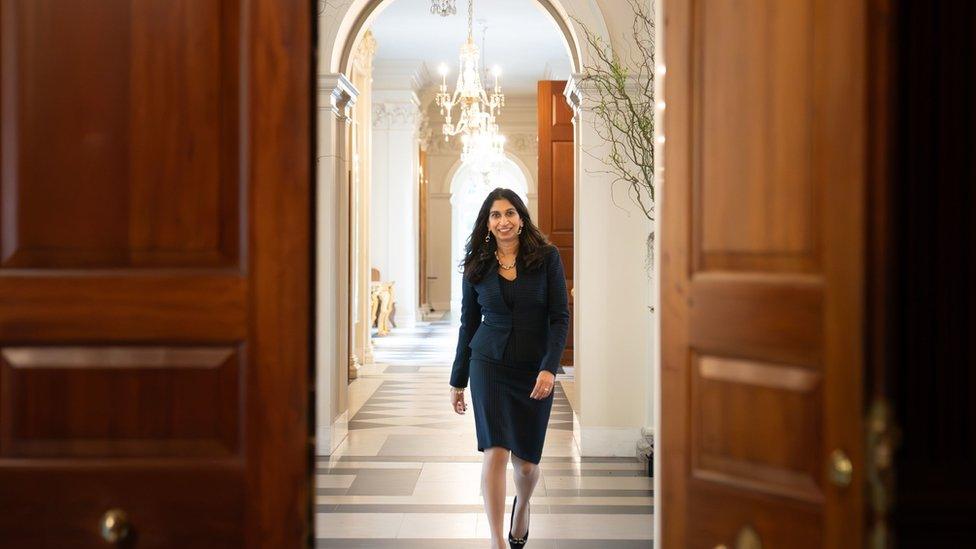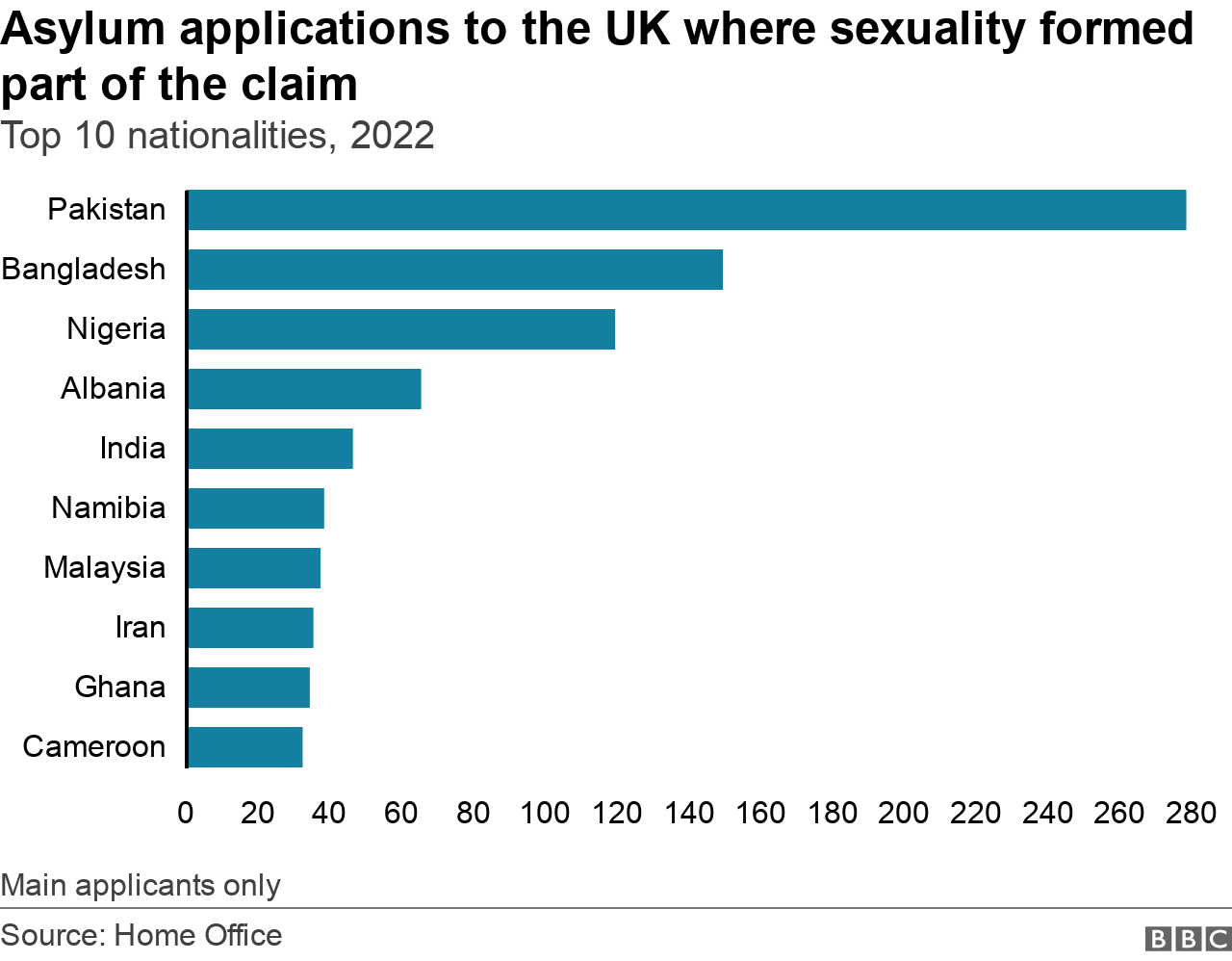Anti-gay discrimination not qualification for asylum, says Suella Braverman
- Published
Braverman: Allowing people to claim asylum after travelling through safe countries is "absurd and unsustainable"
Fearing discrimination for being gay or a woman should not be enough to qualify for international refugee protection, the UK home secretary has said.
Addressing a US think tank on Tuesday, Suella Braverman questioned whether the application of the UN's 1951 Refugee Convention is "fit for our modern age".
Laws have morphed from helping those fleeing persecution to those fearing bias, she argued.
Labour accused her of having "given up on fixing" the asylum system.
"Now she's resorting to grandstanding abroad and looking for anyone else to blame," said shadow home secretary Yvette Cooper.
She accused the home secretary of using gay people and women as "scapegoats" rather than "recognising her responsibility to get a grip of the asylum system".
The Refugee Convention was drawn up following World War Two, and has at its centre the principle that refugees should not be returned to countries where they face threats to their life or freedom.
The home secretary told an audience at the right-wing American Enterprise Institute (AEI) in Washington DC that "we now live in a completely different time" from when the convention was signed.
She said: "As case law has developed, what we have seen in practice is an interpretive shift away from 'persecution', in favour of something more akin to a definition of 'discrimination'.
"The practical consequence of which has been to expand the number of those who may qualify for asylum, and to lower the threshold for doing so."
The definition grants the right for at least 780 million people worldwide to move to another country, according to, external the Margaret Thatcher-founded think tank, the Centre for Policy Studies.
According to the UN the total number of refugees worldwide is much lower, with 35 million people registered as refugees in 2022.
On Tuesday morning, Police Minister Chris Philp told the BBC the convention was being exploited by "economic migrants to try and claim asylum to move between countries".

What is the Refugee Convention?
The Convention was drawn up in 1951 and came into force three years later, during an era where millions were displaced across Europe after World War Two
It was originally drafted to focus specifically on Europe's post-war refugees - but a 1967 amendment removed the geographic and time limits included in the original text and made the Convention universal
The Convention provides an agreed definition of a refugee, establishes basic minimum standards for their treatment, and says that refugees should not be penalised for breaching immigration rules while fleeing
Its core principle is "non-refoulement" - which means refugees should not be returned or expelled from a country against their will if they fear for their life or freedom
Almost 150 countries have signed up to the Convention

Mrs Braverman also used her speech to attack "a misguided dogma of multiculturalism".
"Multiculturalism makes no demands of the incomer to integrate," she said adding: "It has failed because it allowed people to come to our society and live parallel lives in it.
"And, in extreme cases, they could pursue lives aimed at undermining the stability and threatening the security of society."
The home secretary said her parents - who migrated to the UK from Mauritius and Kenya - "both signed up to British values wholeheartedly".
Despite speaking thousands of miles across the Atlantic, Ms Braverman's comments are almost certainly designed to spark debate back in Westminster.
Her decision to visit Washington, and make such a punchy speech, will inevitably be seen through the lens of her own leadership ambitions.
She ran unsuccessfully for the Conservative leadership last summer and is a likely candidate to stand again should Rishi Sunak lose the next general election.
In her speech Ms Braverman said: "Let me be clear, there are vast swathes of the world where it is extremely difficult to be gay, or to be a woman. Where individuals are being persecuted, it is right that we offer sanctuary.
"But we will not be able to sustain an asylum system if in effect, simply being gay, or a woman, and fearful of discrimination in your country of origin is sufficient to qualify for protection.
There are 64 countries that have laws that criminalise homosexuality, nearly half of which are in Africa.
Refugee 'cornerstone'
Given that much of the world is signed up to the existing convention it is unlikely Ms Braverman will manage to drive through reforms.
But Ms Braverman has started a debate which highlights the government's determination to take a tough approach on migration.
The UN has told the BBC that the Convention on Refugees remains "the cornerstone of refugee protection", which has saved "millions of lives".
Shabia Mantoo, of the United Nations High Commissioner for Refugees (UNHCR), said the convention did not need reform but instead needed "international political will and commitment to abide by the obligations for refugees under the international legal framework".
There has also been a backlash from some in the home secretary's own party.
Andrew Boff, a long-serving Conservative member on the London Assembly and patron of the LGBT+ Tories, said "a small minority" of refugees come to the UK.
"I have confidence that her dog whistles won't be heard internationally so she should spend her time on sorting out the appalling backlog of asylum claims rather than distracting us by victim blaming," Mr Boff said.
But Tim Loughton, a Conservative member of the Home Affairs Committee, said Ms Braverman "had a point".
"The UK cannot be the refugee camp for the entire world and that's why we need to look at exactly how these international agreements can work in the 2020s," he told the BBC.

Suella Braverman will also speak to her US counterparts in Washington DC
The question of the right way to define a refugee also feeds into the broader debate about illegal immigration and how to stop people arriving in the UK in small boats.
The home secretary's speech comes as the government prepares for a Supreme Court hearing on whether its plan for tackling small boat crossings is legal.
The government wants to send those who come into the UK illegally to Rwanda or a third country.
The UNHCR has strongly criticised the government's plan arguing it would "deny protection" to genuine refugees and was a "clear breach" of the Refugee Convention.

Analysis

In 2022, there were 1,334 asylum applications lodged in the UK, external, where sexual orientation was part of the basis for the claim.
This represents 1.5% of 74,751 asylum claims made last year.

The top countries of origin were Pakistan, Bangladesh and Nigeria. In all three countries consensual same-sex sexual acts are illegal. They are punishable by life imprisonment and, in some parts of northern Nigeria, by death (according to The International Lesbian, Gay, Bisexual, Trans and Intersex Association, external)
However, sexual orientation may not be the only grounds on which the asylum applications were made.
Also, we do not know whether sexual orientation influenced the outcome of the claims.
